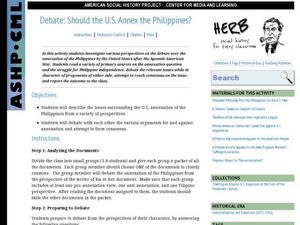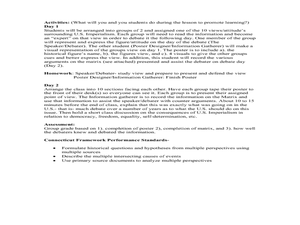Core Knowledge Foundation
Volume 2 - A History of the United States: Modern Times—Late 1800s to the 2000s
The second volume of the Core Knowledge History of the United States ebook begins by asking young scholars to consider the impact immigration, industrialization, and urbanization had on the United States in the late 1800s. The text ends...
PBS
President Theodore Roosevelt: Foreign Policy Statesman or Bully?
Can a negative perception of a president's foreign policy harm his or her historical legacy? A project that winds the clock back to the date of Theodore Roosevelt's death puts students at the editorial desk of a fictional newspaper....
Historical Thinking Matters
Spanish-American War: 5 Day Lesson
Nine historical documents, an interactive online notebook, and a fantastic opportunity for historical inquiry await your pupils in this 5-day lesson plan. Class members identify and discuss various causes for the Spanish-American War...
Historical Thinking Matters
Spanish-American War: 3 Day Lesson
Why did the United States choose to invade Cuba in 1898? As part of a 3-day lesson, your young historians will first develop working hypotheses to answer this question, then work with a variety of historical primary source documents that...
Historical Thinking Matters
Spanish-American War: 1 Day Lesson
After analyzing newspaper articles portraying different perspectives of the explosion of the Battleship USS Maine, your young historians will take a stand on which position is the most believable in both discussion and writing.
US House of Representatives
Hispanic Americans in Congress During the Age of U.S. Colonialism and Global Expansion, 1898–1945
New ReviewTo be Puerto Rican, in the words of one politician, is to be "foreign in a domestic sense." Young historians consider the American role in colonialism and its impacts on Hispanic Americans through the first part of the twentieth century...
US House of Representatives
Exclusion and Empire, 1898–1941
New ReviewOften forgotten and written off as the model minority, Americans with heritage in Asia and the Pacific Islands have played an essential role in American history, including Congress. Budding historians reclaim history by researching the...
National Endowment for the Humanities
The Matter of the Philippines
The United States won the Spanish-American War, so now what? Young scholars act as advisors to President McKinley and use primary sources to recommend what America should do with its territories. Using a variety of perspectives—including...
National Endowment for the Humanities
The Spanish–American War
The Spanish-American War propelled the United States to the world stage and helped create the modern super power. Using web-based primary sources and a WebQuest format, young scholars consider the causes and outcomes for the war. Working...
National Endowment for the Humanities
The Question of an American Empire
As it rose to being the new super power, America had a choice: conquer other nations like its European predecessors, or stay home. Using primary source documents from those thinking about American foreign policy in the late 1800s,...
National Woman's History Museum
Women, Propaganda, and War
Governments rely on propaganda to build support for wars. Class members examine six propaganda posters, two each from the Spanish-American War, World War I, and World War II, and analyze how the way women were portrayed in the posters...
Student Handouts
Working with Primary Sources: The Spanish-American War
Examine the introduction to Our Islands in Their People, written by Major-General Joseph Wheeler. The excerpt, which is about two-and-a-half pages long, is included here along with six questions about the text. Pupils can learn about the...
Student Handouts
Examining Primary Sources: Rudyard Kipling, “The White Man’s Burden” (1899)
Combine literature and history with the poem "The White Man's Burden" by Rudyard Kipling. Pupils read the poem and answer four questions about the text.
Curated OER
Debate: Should the U.S. Annex the Philippines?
Building an argument with supporting evidence is a vital skill. Learners engage in a debate over the annexation of the Philippines after the Spanish-American War. They take on the perspective of an individual from that time period,...
Curated OER
History of Modern Cuba
Set the context for the often-strained relationship between the US and Cuba with this informative and entertaining presentation. From political cartoons to photographs of Fidel Castro and Fulgencio Batista, as well as heartbreaking...
Curated OER
American Becomes a Colonial Power
Exploring the idea of America joining "the imperialist club" at the end of the 19th century, this presentation presents reasons why America not only had the drive to explore the world, but the power and wealth with which to do so....
Curated OER
What Was South Carolina's Role in the Spanish American War?
Seventh graders investigate the role of South Carolina in the Spanish American War. In this imperialism lesson plan, 7th graders analyze primary documents and photographs, in collaborative groups, to determine how the state was involved...
Curated OER
The Spanish American War (1898-1901)
In this online interactive history worksheet, learners respond to 10 short answer questions about the Spanish American War. Students may check some of their answers on the interactive worksheet.
Stanford University
Spanish-American War
Learners discuss why the United States invaded Cuba. In this Spanish American War instructional activity, students watch a movie about the U.S. invasion of Cuba and hypothesize their reasons for doing so. Learners complete a Spanish...
National First Ladies' Library
Missionaries, Expansionism, and The Philippines
Students examine the quality of sources in research in the process of gaining an understanding of the Spanish American War, American expansionism, and the role of missionaries in history. They meet in groups to provide an audio/visual...
Curated OER
Yellow Journalism
Seventh graders investigate yellow journalism and how it affected public opinion and the government during the Spanish American War. They define key vocabulary words, and take notes during a teacher-led lecture. In pairs they read...
Curated OER
Views Concerning U.S. Imperialism after the Spanish-American War
Students research the impact of American Imperialism. In this Spanish-American War lesson, students visit the listed Web sites to discover details about the war and its effects. Students use the information they locate to participate in...
Curated OER
U.S. Expansion and the Age of Empire
In this American foreign policy worksheet, students respond to 2 essay questions about expansionism in the country during the 20th century.
Curated OER
Imperialism
For this U.S. history worksheet, high schoolers read assigned textbook pages regarding Imperialism and respond to 45 short answer questions.

























